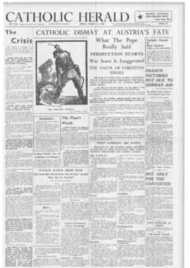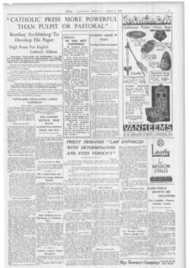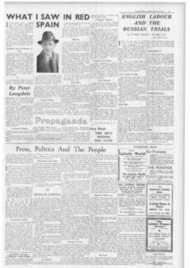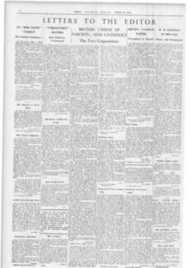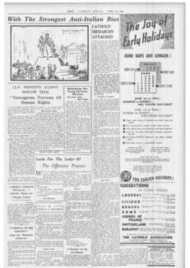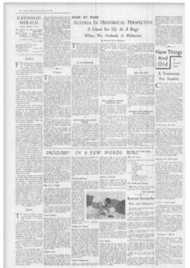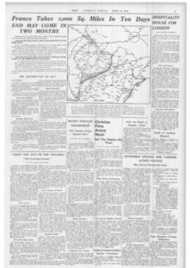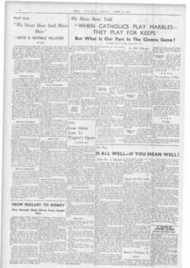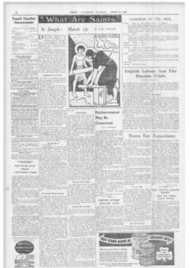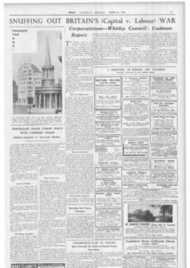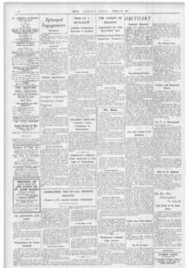Page 6, 18th March 1938
Page 6

Report an error
Noticed an error on this page?If you've noticed an error in this article please click here to report it.
Tags
Share
Related articles
Corporatism : Two Kinds
Corporatism In England
Letters To The Editor
The Corporate State Under The British Flag
Corporatism In Quebec
BRITISH UNION OF FASCISTS ; AND CATHOLICS The Two Corporatisms
SIR,—You appear to have been particularly unfortunate in your issue of March 4. Not content with condoning Mr. Benvenisti's misguided recommendation of heretical writings to the sympathetic attention of Catholics, you suggest that Mr. Derrick, in his book The Portugal of Salazar, puts forward a view which, in fact, he is at pains to deny, and that the thought of Don Luigi Sturzo hears a close resemblance to the nostrums of Sir Oswald Mosley, a baseless accusation which, I have no doubt, Don Sturzo would emphatically repudiate.
Perhaps the clue to such an amazing falsification, not only of the views of men you claim to be quoting. but also of Papal pronouncements, can be found in the astonishing lirst paragraph of Mr. Benvenisti's review, in the same issue, of Tomorrow We Live. Apart from Mr. Twist, Sir Oswald Mosley, it would seem, is " the only person in England ','ho is striving to realise this idea " of the Corporate State. It is evident that both Mr. Benvenisti and yourself, Sir, are labouring under the delusion that the means by which the ruler is designated is a matter concerning the Church or Catholics as such. Since you regard Mr. Derrick's book as of the utmost importance allow me to quote a passage front it which bears on this point: . . it is not possible to claim Papal approval for any system of political machinery . . . The Church regards indifferently any form of government, so long as the essential moral rights of man are acknowledged and safeguarded . . Liberalism is a condemned error . . . But the usual political concomitants of Liberalism—the doctrine of Parliamentary democracy, of universal franchise, of political toleration—do not stand condemned . . If there is in the corporative system (of Salazar) any political significance, then it is something more than the corporative system of which Divini .Redemptoris speaks " (p. 104). You do both Mr. Derrick and Sir Oswald Mosley an injustice in suggesting that there is any resemblance between their ideas.
Quadragesimo Anno and Divini Redeniptoris make plain that what is in need of reform is the State as an institution. The evil result of Liberalism is that a multitude of defenceless individuals is left facing an omnipotent and to a large extent irresponsible State, which moreover is over-burdened with functions it is not fitted to perform. In the economic and political sphere, the Guild Social Order (to use a phrase which distinguishes Pope Pius XI's conception clearly from the ideas of Mr. Benvenisti and the B.U.F.) is concerned with a proper hierarchy of function. And from that point of view it does not matter twopence whether the legislative organ is a Parliament elected by universal suffrage or not. There may be good arguments against Parliamentary democracy, but none that can be based on Catholic teaching on the function of the State. To pretend that the political programme of the B.U.F. bears any resemblance to papal teaching is, at the best, bad scholarship. I would, even at the risk of making this letter burdensomely long, add one more point. Mr. Derrick, in his book, points out that the great difficulty of Salazar and what has led more than anything else to the use in Portugal of dictatorial methods, is the absence there of pre-corporative groupings in society. It happens that this country is peculiarly rich in such groupings. Trade unions, which in practice are not committed to the doctrine of the class war, and Employers' Associations, have already in many trades a long record of fruitful collaboration. A furtherance of such collaboration through Joint Industrial Councils has produced important results in the pottery, flour-milling and boot-andshoe trades, among others. Developed in another direction. co-operation of associations in the cotton trade has brought that industry to the very brink of becoming a true vocational group. If Parliament passes the enabling Bill which the industry itself is preparing, we should have in Lancashire the first true corporation the world has seen. (For, be it added, Italy has not yet succeeded in forming one true corporation). The iron and steel industry is also well advanced in the exercise of true corporative authority. Such pre-corporative institutions, essential if we are to have the growth of a true corporatisme d'association and to avoid the totalitarianism inherent in a corporarisme d'etat, would be destroyed by the policy of the B.U.F. For Mosley, like Mussolini and Hitler, does not eschew the Liberal doctrine of the self-sufficiency of man and society, but enshrines it in his philosophy as the motive force of Government. Compare Rousseau; " Each of us puts his person and all his power under the supreme direction of the general will, and in our corporate capacity, we receive each member as an indivisible part of the whole" (The Social Contract, Bk. 1, Ch. 6): with Mosley; " Every man shall be a member of the State, giving his public life to the State, by claiming in return his private life and liberty from the State, and enjoying it within the corporate purpose of the State " (The Greater Britain, p. 40). Far from freeing the State of the burdens it is not fitted to bear, Fascism would add further to them.
I suggest, Sir. that editorial apologies to Don Sturzo and to Mr. Derrick would be in order. J. R. KIRWAN.
Catholic Workers' College, Oxford.
I The seoond part. of the above letter is valuable, and for this reason we publish it. Nor ha e the Cvnicit.tc Hamm) ever denied a word of it. In the rery article criticised it was stated that Mosley's philosophy is far nearer 'to Hitler's than Salazar's, and his policy criticised on Christian grounds. All we asked for was as fair a Catholic examination of his views as of any others, seeing how far removed from Christian philosophy till modern secularist policies are.
The first part, we fear, is just the kind of nonsense writing which outarticle condemned. Who has pronounced Mosley' writing heretical? The Pope or Mr. Kirwan himself? Heresy is a technical term
the unseeing a mai sh. Kr. Kirwan 'night look up. And what sense is there in interpreting our remark that Don Sturzo's views, as gathered from a report of a paper of his, bear a M tic lt closer analogy to what L.4 hlajipoutug in Portugal or to what might happen under the B.U.F. than to our present system as " the thought of Don Luigi Sturm bears a close resemblance to the nostrums of Sir Oswald Mosley "? Don Sturzo himself dealt with this point last week, and the discussion turned upon whether Salazar and Mosley favour a corporatism! tiYhtt or a rorporatistne trossooiatino. Tr the latterand the point is still in ilispute—then our view was entirely justified hy Don Sturm, himself. Nor did we stale that Catholicism Favours one kind of pulitical regime rather than another, but asserted that it is very interested in what kind of politieal or moral philosophy lies behind any regime. and what severity there is for spiritual and moral rights. -Eorroa.j
"The Acid Test"
SIR,-" 1-1. J." once more trots out Mosley's " acid test," but in my edition for 1934 Mosley has left out the phrase that " this test overrides all considerations of religion." " H. J." has omitted that " any Fascist is free to add any other moral consideration which his private conscience or religious belief dictates." For a generation, at least, Catholics have supported the old parties who have made divorce easy, who have countenanced the betrayal of Catholic interests in Northern Ireland, who have by no means been helpful in our struggle to provide our children with a Catholic education in a " Catholic atmosphere." Why then all this sudden scruple? To try and make the Sovereign responsible for the introduction of the corporate state is to drag his Majesty into a political battle to the end that the Crown will be submerged in a political quarrel from which it is extremely doubtful it would survive. No, let us preserve our King from the politics. May I beg to endorse what " Londoner" says about religious atmosphere in our schools. I was encouraged to send my two eldest children to Catholic schools because of the Catholic atmosphere; my youngest boy has had to go to a nonCatholic school and I am by no means happy at the loss of this atmosphere but am determined to make sure that he will have the advantage of this subtle, but important, benefit. • The trouble is that for some, Mosley can do nothing right. R. N. CLARK.
The Hermitage, Callow End, Worcester.
Distribution Better
SIR,-1 admire Catholic Fascists for trying to achieve what they believe the only practical application of papal teaching. But if they examined the policy of the newly-founded Distributist Party, they would find that it approximated much more closely to Catholic principles. I would urge that those who take their responsibilities seriously should judge for themselves the claims of the party by writing for details to the secretary at 10, Yateley Avenue, Great Barr, Birmingham. I particularly urge your correspondent Mr. Clark to do this, for his ideas on Disuibutism are a tragic farce. Some bright soul is sure to reply that Distributism is a beautiful ideal, but quite impracticable. My own experience is that most people who make this charge have very hazy notions about Distributism, or have formed their ideas of the movement through conversations with philosophicallyminded gentlemen, who are not interested in its practical application. should like to take this opportunity of congratulating the CATHOLIC. HERALD for giving the B.U.F. a fair hearing, and I hope that Catholic Fascists will take this opportunity of finding out something about the Distributist Party,
A. A. J. Orchard Farm, Broadway, Worcestershire.
Mosley and the Forces of Jewish Usury
SIR,—The lener from Si, Oswald Mosley in your issue of the 25th contains a curious contradiction. Sir Oswald is concerned to point out that Fascism believes in religious toleration—" Render to Caesar the things that are Caesar's and to God the things that are God's." Yet in seeking to vindicate his statement that "Any nation has the right to demand that the people of that nation shall not ascribe to forces whether religious or racial, outside of that nation " he defines those outside forces as " Jewish usury," and in so doing, gives a fair example of Fascist religious and racial intolerance. In the first place, do the forces of Jewish usury exist anywhere except in the warped imagination of the Fascists as a useful propaganda myth? In the second place, how can the Christian belief in the universal brotherhood of mankind, in the equality of individuals of all races and creeds and in the precept to " Love Thy Neighbour" be reconciled with the obvious view of Fascism that loyalty to race and nation must over-ride all other loyalties, and that (in the words of Dr. Kerrl, Minister for Church Affairs in Germany) " neighbour means blood-brother "? Sir Oswald Mosley limits the " forces outside the nation " to which " the people of that nation shall not ascribe " to " Jewish usury." But, be it noted, we are expected to accept his definition of what constitutes "Jewish usury." Were Sir Oswald in power, at the head of a Fascist Government, it would be Caesar (the State) who had power to define the limits between the things of Caesar and the things of God. The Church takes second place and its rights are defined by the State.
Such a position cannot be accepted by
the Catholic Church. Our first loyalty must be to God and His Church throughout the world. There is no good burking the fact that this may mean, as it has done in Germany. a clash of forces between Church and State. The Church must protest against the incursion of the State into the religious sphere and retain for itself the right to define that sphere. This right (Continued in next column.) Sir Oswald Mosley is not prepared to grant. This is the unbridgeable gulf between Fascism and Christianity and particularly between Fascism and the Catholic Church. In the case of the British and German Fascist movements, which have adopted strong racial theories the span between Church and State is widened. Sir Oswald Mosley is no doubt sincere in his belief in religious toleration. But he does not realise the full implications of such a belief.
PAT GRIFFITH.
21, Powis Square, W.11.
Communism and Fascism Similar
SIR,—It seems that I must substantiate my thesis that Fascism is dangerous. Again I would draw the attention of your readees to two books by Waldemar Gurian, The Future of Bolshevism and Hitler and the Christians, and to articles and letters appearing in the Colosseum (Spring and Autumn, 1937), by the same author. He is able to show that Communism and Fascism are essentially the same, and that Fascism, moreover, is the more dangerous to Western civilisation in that it is better suited to Western minds. Others than myself have shown in recent correspondence in your columns. the similarity of the two theories of the state. That Communism is essentially Eastern is shown by Berdyaev in The End of Our Time. Events in Austria support my contention that Fascism is a form of Tudor Nationalism. Some will argue that Fascism and Nationalism are merely coincident in Italy and Germany. British Fascism, however, seeks with the same spirit (cf. A parody of Chesterton in Action: " When the Rolling English drunkard made the Rolling English road, Then he made it for the Englishman not the slimy alien toad." The boasting of Fascist songs, and indeed almost every copy of The Blackshirt and Action).
Mr. Cook has quoted more fully from What the British Union has to offer Britain, but my point remains. He may obtain further food for thought in the last four questions of Mosley's 100 Questions Asked and Answered. He states the need tor immediate action, which statement I applaud. As you, Sir, have hinted, Fascism is unlikely to succeed in England. Its very name tells heavily against it. The Distributist programme is obtainable from the Party headquarters at Birmingham. It is a sound, sane programme for England and by no means requires universal application. It incorporates all those many points which make the B.U.F. the great movement it is, but omits those essentially anti-Catholic points which make many like myself turn from it.
CHARLES DAVY.
Savorn Lodge, WOICE5ICI.
blog comments powered by Disqus


